Top Rankings
John Hancock Charter School District ranks among the top 20% of public school district in Utah for:
Category
Attribute
Overall Rank
Highest overall rank (Top 10%)
Math Proficiency
Highest math proficiency (Top 5%)
Reading/Language Arts Proficiency
Highest reading/language arts proficiency (Top 20%)
Science Proficiency
Highest science proficiency (Top 5%)
Student Attention
Lowest student:teacher ratio (Top 1%)
For the 2025 school year, there is 1 public high school serving 752 students in John Hancock Charter School District.
Public High Schools in John Hancock Charter School District have a diversity score of 0.41, which is less than the Utah public high school average of 0.45.
Minority enrollment is 25% of the student body (majority Hispanic), which is less than the Utah public high school average of 29% (majority Hispanic).
Overview
This School District
This State (UT)
# Schools
2 Schools
357 Schools
# Students
931 Students
304,700 Students
# Teachers
56 Teachers
13,717 Teachers
Student : Teacher Ratio
17:1
17:1
District Rank
John Hancock Charter School District, which is ranked within the top 10% of all 153 school districts in Utah (based off of combined math and reading proficiency testing data) for the 2020-2021 school year.
Overall District Rank
#13 out of 154 school districts
(Top 10%)
(Top 10%)
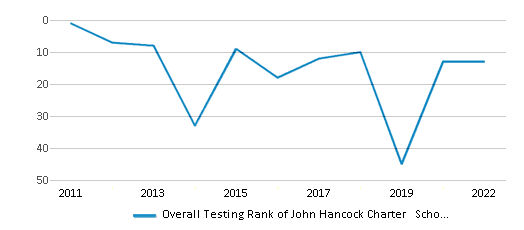
Math Test Scores (% Proficient)
(20-21)60-64%
39%
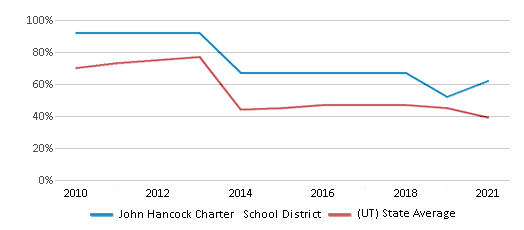
Reading/Language Arts Test Scores (% Proficient)
(20-21)50-54%
43%
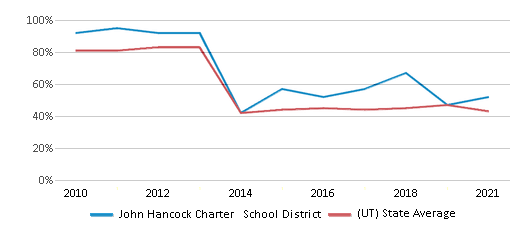
Science Test Scores (% Proficient)
(20-21)62%
45%
Students by Ethnicity:
Diversity Score
0.40
0.45
# American Indian Students
2 Students
2,617 Students
% American Indian Students
n/a
1%
# Asian Students
3 Students
5,001 Students
% Asian Students
n/a
2%
# Hispanic Students
138 Students
59,783 Students
% Hispanic Students
15%
20%
# Black Students
7 Students
4,038 Students
% Black Students
1%
1%
# White Students
705 Students
217,573 Students
% White Students
76%
71%
# Hawaiian Students
27 Students
4,429 Students
% Hawaiian Students
3%
1%
# Two or more races Students
49 Students
11,163 Students
% of Two or more races Students
5%
4%
Students by Grade:
# Students in PK Grade:
-
458
# Students in K Grade:
114
3,590
# Students in 1st Grade:
121
3,628
# Students in 2nd Grade:
123
3,655
# Students in 3rd Grade:
126
3,723
# Students in 4th Grade:
120
3,717
# Students in 5th Grade:
125
3,667
# Students in 6th Grade:
99
4,950
# Students in 7th Grade:
79
27,723
# Students in 8th Grade:
24
34,647
# Students in 9th Grade:
-
53,806
# Students in 10th Grade:
-
55,206
# Students in 11th Grade:
-
54,320
# Students in 12th Grade:
-
51,610
# Ungraded Students:
-
-
District Revenue and Spending
The revenue/student of $2,018 in this school district is less than the state median of $10,732. The school district revenue/student has declined by 80% over four school years.
The school district's spending/student of $2,003 is less than the state median of $10,829. The school district spending/student has declined by 80% over four school years.
Total Revenue
$2 MM
$7,309 MM
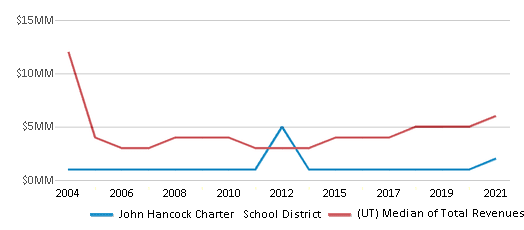
Spending
$2 MM
$7,375 MM
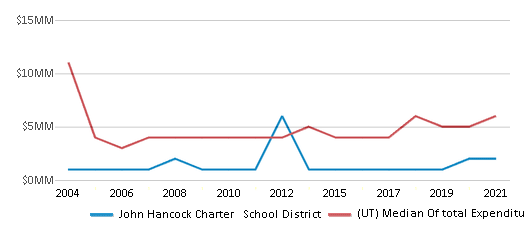
Revenue / Student
$2,018
$10,732
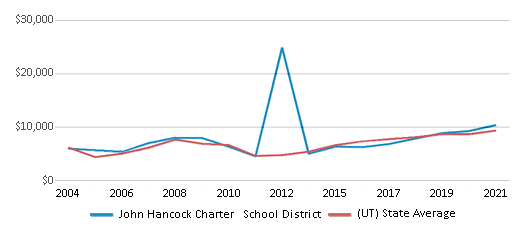
Spending / Student
$2,003
$10,829
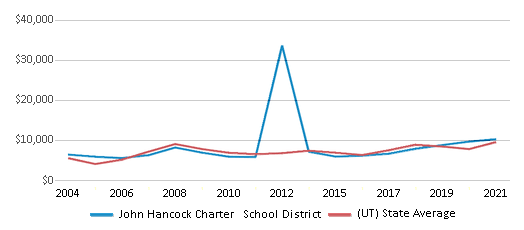
Best John Hancock Charter School District Public High Schools (2025)
School
(Math and Reading Proficiency)
(Math and Reading Proficiency)
Location
Grades
Students
Rank: n/an/a
John Hancock Charters School Eagle Mountain
Charter School
2890 N Scarlet Road
Pleasant Grove, UT 84062
(801) 796-5646
Pleasant Grove, UT 84062
(801) 796-5646
Grades: K-12
| 752 students
Recent Articles

Year-Round Or Traditional Schedule?
Which is more appropriate for your child? A year-round attendance schedule or traditional schedule? We look at the pros and cons.

Why You Should Encourage Your Child to Join a Sports Team
Participating in team sports has a great many benefits for children, there is no doubt. In this article you will learn what those benefits are.

White Students are Now the Minority in U.S. Public Schools
Increasing birth rates among immigrant families from Asia and Central and South America, combined with lower birth rates among white families, means that for the first time in history, public school students in the United States are majority-minority. This shift in demographics poses difficulties for schools as they work to accommodate children of varying language abilities and socio-economic backgrounds.





